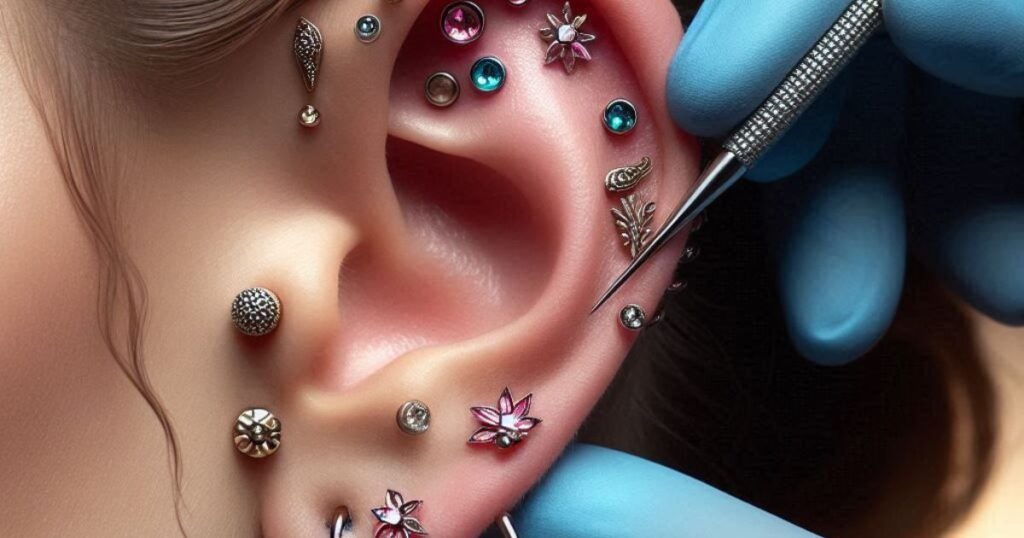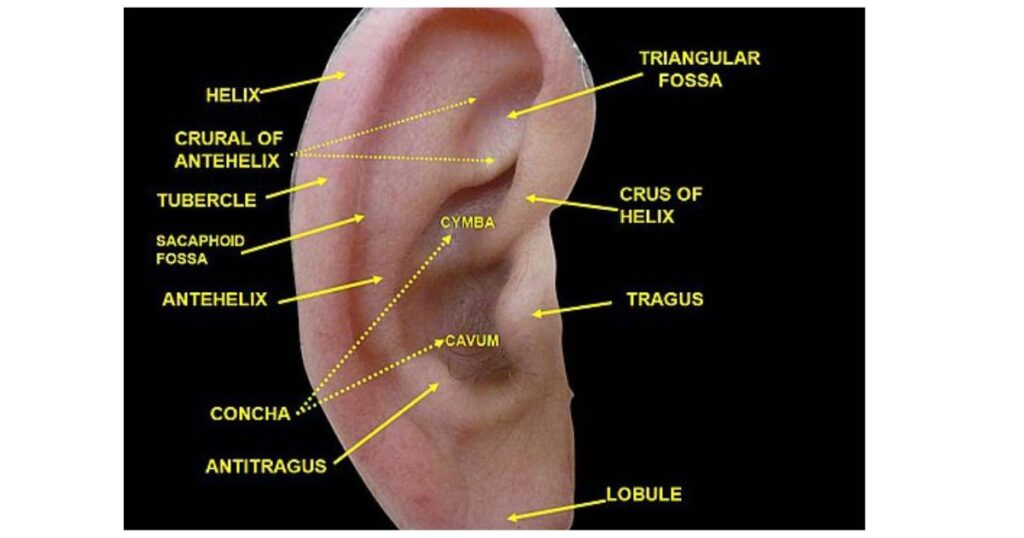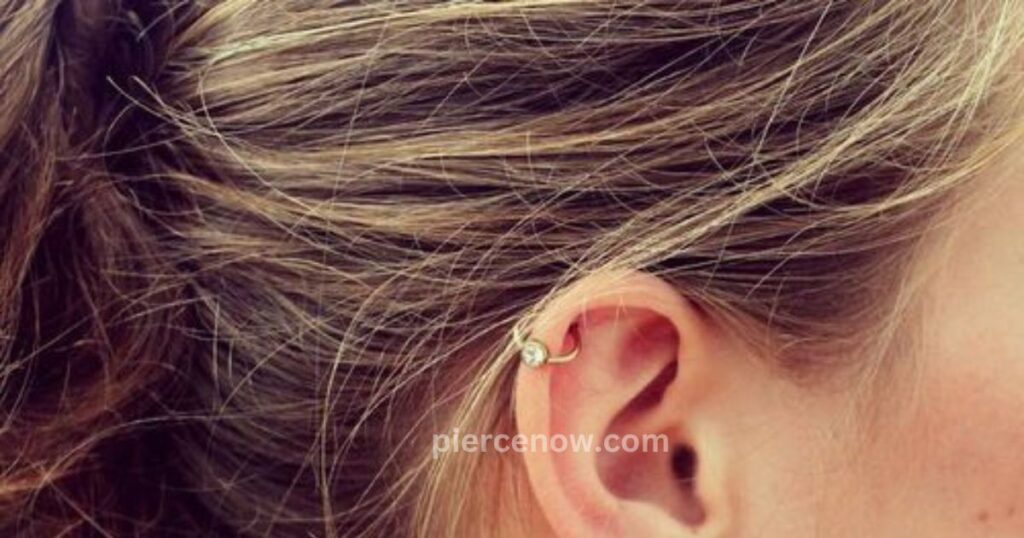Ear piercings can close in a few hours to several years, depending on factors like age, healing time, and how long you’ve had the piercing. The longer you’ve had the piercing, the longer it will take to close.
Let’s explore how different conditions affect how quickly your ear piercings might close and what you can do to manage them.
Factors That Affect How Long It Takes for Ear Piercings to Close
Several factors impact how quickly an ear piercing closes. Understanding these will help you better gauge your situation.
The Age of the Piercing Matters
The age of your ear piercing is the main factor in how long it will take to close. Fresh piercings close faster than older ones because the tissue hasn’t fully healed yet.
- New Piercings (Less than Six Months Old): If your piercing is new, it can start closing up within hours of removing the earring. The body treats the piercing as a wound and will try to heal it quickly. If you want to keep your piercing, avoid taking the earrings out for extended periods in the first six months.
- Piercings Between Six Months and One Year Old: At this stage, the healing process is still active, but the piercing won’t close as fast. However, it can still close within days or weeks if left without jewelry. It’s important to wear earrings regularly to prevent this.
- Piercings Older Than One Year: These piercings are fully healed, so they are less likely to close quickly. However, the hole can shrink if you leave it without jewelry for a long time, especially in the first few years. After that, it may take months or years for the piercing to close completely.
In some cases, the hole may never fully close, even after years without wearing earrings.
Individual Healing Rates
Everyone’s body heals differently, and this can affect how quickly an ear piercing closes. Some people heal faster than others, causing their piercings to close sooner.
- Fast Healers: People with fast healing rates might notice that their piercings close quicker than expected, even if they’ve had the piercing for a while. In these cases, it’s important to wear earrings consistently.
- Slow Healers: If your body heals slowly, your piercing might stay open longer without jewelry. However, it’s still essential to avoid leaving earrings out for too long, especially with new piercings.
Type of Ear Piercing
The type of ear piercing you have can also affect how long it takes to close. Lobe piercings are the most common and tend to heal faster than other types of ear piercings, like cartilage piercings.
- Lobe Piercings: These piercings heal relatively quickly and are less likely to close once fully healed. New lobe piercings can close in a few hours if left without earrings, while older ones may take several months or even years to close.
- Cartilage Piercings: Cartilage piercings take longer to heal and are more prone to closing. Even fully healed cartilage piercings can close in weeks or months if not worn regularly. It’s crucial to avoid taking cartilage earrings out for long periods, especially in the first year.
Age and Skin Elasticity
Age plays a role in how fast your piercings close, as skin elasticity changes over time.
- Younger People: Younger individuals typically heal faster, and their piercings may close quicker if earrings are left out. However, this also means their skin adapts more easily to keeping a piercing open if earrings are worn regularly.
- Older People: As people age, their skin becomes less elastic. This can slow down the healing process, meaning older individuals may notice their piercings take longer to close, even if they’ve had the piercing for years. However, because of reduced skin elasticity, fully healed piercings in older adults may not close completely.
How Often You Wore Earrings
The amount of time you wore earrings after the initial healing phase will also influence how long the piercing stays open. If you regularly wore earrings for several years, your ear piercing may take much longer to close, or it might stay open permanently. If you only wore earrings occasionally, the hole could close more quickly.
What to Do if Your Piercing Closes
If your ear piercing closes, it will usually start to heal over from the outside in. This means that a thin layer of skin will form over the hole, but the deeper part of the piercing might remain open.
If your piercing does close, you have options depending on how long it’s been closed.
- Recently Closed Piercings: If it’s only been a few days or weeks, you may be able to reopen the piercing yourself by gently pushing an earring through the hole. Be sure to use clean hands and disinfect the jewelry before attempting this.
- Long-Closed Piercings: For piercings that have been closed for months or years, it’s best to visit a professional piercer. They can assess whether it’s safe to reopen the hole or if you’ll need a new piercing. Attempting to force an earring through a long-closed hole can lead to infection or scarring.
How To Prevent An Ear Piercing From Closing?
If you want to keep your piercings open, there are a few steps you can take to reduce the risk of closure:
- Wear Earrings Regularly: This is the most effective way to keep your piercings open. Try not to leave them without jewelry for extended periods, especially in the first year.
- Use Retainers: If you need to take your earrings out for work, sports, or other reasons, consider using clear or flesh-colored retainers. These can keep the hole open without being as noticeable as regular earrings.
- Rotate Jewelry Regularly: Rotating the earrings gently in the piercing can help maintain the hole, especially in newer piercings. However, avoid rotating too often as this can irritate the area and slow down healing.
FAQ Quick Answers:
How long can I leave my earrings out?
For fresh piercings, avoid leaving earrings out for more than a few hours to prevent closure. Fully healed piercings can typically handle days, weeks, or even months without earrings, depending on the individual.
How can I close my ear hole naturally?
To close an ear piercing naturally, simply stop wearing earrings. Over time, the hole will shrink and heal, especially for fresh piercings. Older piercings may never close completely, but the hole can become less noticeable.
Can earring holes close up after 10 years?
Yes, but it’s unlikely they will close completely. Even after 10 years, an earring hole might stay partially open, although it may be more difficult to insert earrings if not worn regularly.
A Summary
How long it takes for ear piercings to close depends on several factors, including the age of the piercing, how your body heals, the type of piercing, and your age. New piercings can close in hours, while older ones may take months or years to close.
To prevent closure, wear earrings regularly and follow proper aftercare routines. If your piercing closes, don’t hesitate to seek professional advice on reopening it safely.



